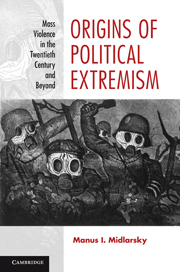Book contents
- Frontmatter
- Contents
- List of figures and tables
- Preface
- Introduction
- PART I Theory and Empirics
- 1 The Ephemeral Gain: Intimations of the Politically Finite
- 2 Mortality Salience: Intimations of the Corporeally Finite
- 3 Cases
- PART II The Secular “Isms”
- PART III An Ostensibly Sacred “Ism”
- PART IV Extreme Nationalism
- PART V Conclusion
- References
- Index
2 - Mortality Salience: Intimations of the Corporeally Finite
Published online by Cambridge University Press: 05 June 2012
- Frontmatter
- Contents
- List of figures and tables
- Preface
- Introduction
- PART I Theory and Empirics
- 1 The Ephemeral Gain: Intimations of the Politically Finite
- 2 Mortality Salience: Intimations of the Corporeally Finite
- 3 Cases
- PART II The Secular “Isms”
- PART III An Ostensibly Sacred “Ism”
- PART IV Extreme Nationalism
- PART V Conclusion
- References
- Index
Summary
This chapter establishes the connection between intimations of mortality, or mortality salience as it is known in the social psychological literature, and the rise of political extremism. Mortality salience is the companion variable to the ephemeral gain, whose pathways to extremism were explored in the preceding chapter. War is not only a clear processual incubator of violence, but ultimately can yield political extremism. World War I is the seminal event of the twentieth century, which, despite important antecedent events like the Russo-Japanese War of 1904–05 that will be explored elsewhere in this book, nevertheless exerted its unique and extraordinary impact.
On the whole, the immediate origins of European fascism are not in dispute. Virtually all major analysts of the etiology of this phenomenon agree that World War I was crucial. Fundamental causes, or more precisely long-term processes, as well as ideational content tend to be disputed, but the immediate importance of World War I is seldom contested. Reasons for this emerging consensus are not hard to find. Virtually all of the important fascist leaders of the interwar period experienced battle at the front, or were close to those who did. According to the cognitive psychologist, Seymour Epstein, “Experientially derived knowledge is often more compelling and more likely to influence behavior than is abstract knowledge.” Simply the return of large numbers of battle-hardened veterans could destabilize societies already exposed to significant economic, social, and especially political strains associated with maintaining the home front intact.
- Type
- Chapter
- Information
- Origins of Political ExtremismMass Violence in the Twentieth Century and Beyond, pp. 55 - 68Publisher: Cambridge University PressPrint publication year: 2011

